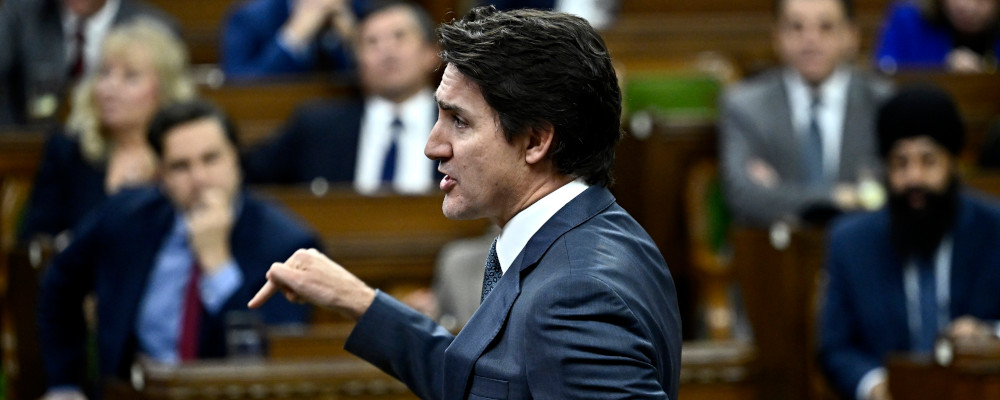Canadian politics is almost entirely superficial. Perhaps this is true of politics everywhere, or even most politics through history, but if true (and I don’t think it is) that is cause for regret rather than consolation.
Our politics is superficial because we have insulated it from first principles. On those occasions when they are called into political service, ideas of truth, justice, beauty, free will, and equal dignity are usually deployed as rhetorical flourishes to an emotional appeal, not as the foundation of arguments. Words with deep meaning are deployed meaninglessly; first principles have become secondary considerations.
We hear often about “evidence-based” policy, but evidence cannot be the starting point of policy or its foundation. Evidence can help you reach your goal effectively, but only after you’ve determined both where you want to go and why you want to get there. For that you need an understanding of the basic goods of human life and the application of practical reason. If your goal has not been reasoned intelligently from first principles, evidence is useless. Irrelevant.
It is bad enough that we no longer speak in terms of the dictates of right reason, the natural law, the common good, the cardinal virtues, or even the morally emaciated principles of utilitarianism, but it is even worse that we rarely ever think in those terms anymore. Most of the time, the rightness of a preferred policy is assumed, not justified, and we skip to debating means without ever properly considering the ends.One exception is in some areas of social policy, such as civil rights, abortion, and matters touching on human sexuality, where some appeal to first principles is unavoidable. Even then, we tend today to shrink from full-throated appeals to the natural law that governed and guided politics for most of history. See generally Alasdair MacIntyre, ‘Politics, Philosophy and the Common Good’ in Kelvin Knight (ed), The MacIntyre Reader (U of Notre Dame P 1998) 240.

For example, Canadian media these days are full of calls for economic growth and cheaper goods, but we no longer ask why we want this, and at what cost? What is growth for? Is all growth good? Do we want growth at any cost? The answer to those questions would require us to consider the trade-offs that come with both growth and cheapness. Do we want cheaper food if it is less healthy and worse quality?Or do we need all food to be available all the time, and at what cost? Do we really need strawberries in the winter, if it means replacing old local varieties that are small, sweet, and perishable with corporate-trademarked varieties that are large, tasteless, and indestructible? I think of this every time a restaurant serves me one of those pale pink strawberries-in-name-only with their pasty, tasteless white flesh, barely fit for a garnish.
Even if we assume for the sake of argument that, all things considered, gains in affordability outweigh the loss in quality and nutrition in food, an increase in pollution, offshoring to low-wage, low-standard countries, and the depletion of our soil, does that calculation apply to all goods? Do we really need cheaper clothing or entertainment devices if it means they are worse made or come from Chinese prison workshops?
Ah, you may say, but that is what people want, and in a democracy, vox populi, vox dei.In the sense used by Archbishop Reynolds, not Alcuin. What an anaemic idea of government! There must be more to governing than sussing out and satisfying revealed preferences. An AI program could do that better than politicians, and that being so, what does it say about the depth of such a thin concept of democracy? The role of government is to ensure we get the growth and goods we need while minimising trade-offs (moral and otherwise), and that requires prudence and discernment.
Every field of public policy would benefit from a reconsideration from first principles, but I will note two that are currently top of mind for Canadians.
The first is housing. This debate is usually framed in terms of how we can build more houses faster.Or (shudder) “units,” as though anyone ever dreamed of raising their family in a “unit.” It’s the right question, but we ask it too quickly. What we should be asking first is, what sort of society do people need to live a good life? Then we can ask, what kind of neighbourhoods and communities would facilitate that? Only then should we ask, how do we build those communities as efficiently as possible?
If you don’t start with first principles—if you don’t start with an idea of what a healthy community looks like—then you end up, as Justin Trudeau did recently, announcing the building of modular units that look more like stacked packing crates than somewhere a human should live. You will get tinny towers of tiny boxes without any consideration of how they conduce to human flourishing or, to quote troubadour and amateur urban planner Cat Stevens, “Where do the children play?”
The choice isn’t between more homes and fewer homes or even faster and slower; it’s between atomised “units” on a government spreadsheet and homes that are part of communities that will produce the conditions for long-term human happiness. There is nothing wrong in principle with pre-fabricated modular homes, but they have to be designed to be attractive and then attractively arranged to form communities with the parks, shops, streets, and public spaces a society needs to flourish.
A good neighbourhood—the kind that Pierre Poilievre extolled at the end of his speech at the Canada Strong and Free Network conference last week—is more than a collection of hastily-assembled units. Building a neighbourhood that serves the needs of healthy families requires a balance between sensitive planning and free, organic, and private growth. Otherwise we will get more ugliness, more coarseness, more division. If we build more homes but the result is a worse society, that’s a pyrrhic victory at best.
The second field is immigration, where our governments and the media too often think in terms of numbers instead of people. From business lobbyists, CEOs, and college and university presidents, we get a constant drumbeat for more, more, more. Sometimes politicians or their proxies will say we need more people to boost national growth and raise national GDP (though rarely GDP per capita). Almost never do we think more deeply than that.
These discussions of immigration policy talk about newcomers as if they were widgets, fungible parts in a machine rather than humans who will embed themselves into our society—or not. It is telling that this is quite different from the way most people experience immigration and talk about it in day-to-day life, where they rely on their immediate experience of individual newcomers, good and bad.
Normal people know intuitively that the difference between society and a machine is that in a society the identity of each person matters, not just their function. You can replace the parts of an engine regularly and it will be just fine, maybe even better. But you can’t simply swap out your neighbours every few weeks and call what you have a community.

If your town needs a new doctor, it can bring one in from somewhere else in Canada or another country. However, if in addition to performing his professional function, the new doctor does not also see himself as, and act as, a part of the community, you will have filled the role of doctor, but there still be a hole in the community. Immigration isn’t just about filling jobs, it’s about building a country.
No political philosopher going back to Aristotle has thought that citizens and foreigners are interchangeable, so that the people of one society may be swapped carelessly with those of another. Foreigners can be integrated into a society—Canada has shown this in the past—but they will also change it. That’s not necessarily a bad thing. Change is an inevitable law of nature, but it’s not neutral. Some change is beneficial and other change is damaging, but it’s never indifferent.
Thinking about immigration policy in terms of first principles, you would start with the question, what makes a good polis? Then, how do citizens fit into and contribute to a politeia, the way of life in a polis? Finally, what makes a good citizen, a polites? Only then can you start to shape your immigration and integration policies. There is more to immigration than economics and more to citizenship than a passport, but our governments downplay the questions of how to select newcomers or how to turn non-Canadians into Canadians.
It will take serious people exercising prudential reason to ensure that future immigration occurs as successfully as the most successful examples of immigration in our past. This includes learning the lessons of history, assessing what is different today, deciding not just what numbers (though that is obviously important) but which persons will strengthen our society, and then determining how to identify them, how to attract them, and how to help them integrate when they arrive.
Whether it’s housing and immigration or family policy, pensions, education, taxes, or diplomacy, when you return to first principles you find yourself asking different and better questions that produce more relevant answers. And when you lose sight of first principles, you lose the means to shape politics. You are stuck with a constrained choice between whatever options land on your desk. That is choosing, not governing.
Politics detached from first principles is mostly reactive. You are too distracted putting out fires, playing whack-a-mole—pick your cliché—to plan carefully and coherently. Policies become inconsistent and then incoherent, with no regard for the intransitive implications for society of each unrelated choice. You end up chasing whimsical preferences without map or guide into the ideological wilderness, until one day you look up and find that you are hopelessly lost in a country you no longer recognise.
Recommended for You

The government’s proposed anti-hate law is a necessary response to extremism

The government’s proposed anti-hate law is a threat to Canadians’ religious freedoms

In defence of the Great One

‘Every hand went up when asked who’s afraid of America’: Is Elbows Up just political hype?




